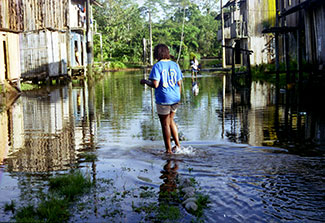
How can we conduct research in humanitarian crises?
September / October 2017 | Volume 16, Issue 5
When Hurricane Harvey struck Texas, I found myself stranded in Houston. From my perch on the 16th floor of a downtown apartment building, I watched the water rise, inching up until it covered many of the roadways around me. Turning on television news, I saw similar images from the other side of the world, as people in Bangladesh, India and Nepal struggled to survive horrific floods. My sense of helplessness at my inability to alleviate their suffering was overwhelming.
Then came Hurricanes Irma and Maria, devastating much of the Caribbean and causing death and destruction across Florida and Puerto Rico. In their aftermath, we have seen elderly die from the extreme heat, and others succumb to infections from polluted water. We are watchful for an increase in mosquito populations and the disease risks they bring. In the aftermath of flooding in South Asia, thousands became ill with diarrhea and respiratory infections.

Photo by Dr. Karen Levy
File photo of flooding in Ecuador, captured by a Fogarty
grantee. Research to improve global humanitarian
responses could benefit communities impacted by
hurricanes, floods and other natural disasters.
grantee. Research to improve global humanitarian
responses could benefit communities impacted by
hurricanes, floods and other natural disasters.
Officials are also struggling to provide services for about half a million Rohingya people who’ve arrived in Bangladesh since August. Many fled Burma with nothing but the clothes on their backs and are traumatized and in need of clean water, sanitation and shelter.
Disaster also struck closer to home, when Mexico City was again rocked by an earthquake that killed hundreds and left many others with terrible trauma and injuries.
It is astonishing to me that these are only the crises we have witnessed in the last month! When we consider the world’s ongoing humanitarian disasters, numerous conflict zones, overflowing refugee camps, deadly infectious disease outbreaks, famine-ridden territories and on and on, we can see there is great unmet global need. How can we improve our response to these all-too-common occurrences? How can we better prevent and treat the resulting physical and emotional injuries? How can we help communities be more resilient to these shocks? What is the research agenda and how can we conduct studies in the midst of these tragic events?
So it is timely that we are launching a new activity - Conducting Health Research in Humanitarian Crises - led by our in-house think tank, Fogarty’s Center for Global Health Studies. This cross-cutting project aims to encourage more research in humanitarian emergencies, increase collaboration among investigators and aid organizations, and identify strategies to ensure uptake of evidence into policy and practice.
Natural disasters affect about 160 million people worldwide each year, with a disproportionate impact falling on those living in low- and middle-income countries (LMICs). Another 170 million people globally have seen their lives disrupted by armed conflict. Many of them have been forcibly displaced and are living in temporary circumstances that may lack security, clean water, sanitation, medicine and an adequate food supply. Children in LMICs experiencing conflict are at tremendous risk and are twice as likely to die before the age of five than children in more stable settings.
While humanitarian crises are incredibly difficult environments in which to conduct research, there are many pressing questions that cry out for answers. Response efforts are often based more on anecdotal experience rather than evidence from rigorous research. Our project will further develop that by adding stakeholders across disciplines and geographic locations, and will represent scientific, humanitarian and policymaking communities. Importantly, we are building on a wealth of expertise from the NIH Disaster Research Response program, which offers data collection tools and protocols. Our project will build on that by adding a focus on LMIC settings, and take a deeper look at cross-cutting challenges such as methodological barriers, ethical issues, partnership strategies, research capacity building, implementation science and research uptake.
To assist us in this endeavor, we are fortunate to have two excellent project co-chairs - Dr. Iman Nuwayhid of the American University of Beirut and Dr. Brandon Kohrt of George Washington University. For this initiative, we are also collaborating with our partners across NIH, as well as representatives from CDC, USAID, WHO, Wellcome Trust, the International Development Research Centre, Doctors Without Borders and others.
I hope other members of our community will also see this as a priority and provide input. For the millions suffering around the world, research to improve the global humanitarian response can’t come a day too soon.
More Information
- Conducting Health Research in Humanitarian Crises from Fogarty’s Center for Global Health Studies
- NIH resources:
- NIH Disaster Research Response program
- NIH Extramural Response to Natural Disasters and Other Emergencies from the NIH Office of Extramural Research (OER)
- Reminder: NIH Natural Disaster Policy - Hurricane Irma (NOT-OD-17-113)
- Reminder: NIH Natural Disaster Policy - Hurricane Harvey (NOT-OD-17-106)
- Notice of Assistance Available to Institutions Impacted by Hurricane Harvey (NOT-OD-17-111)
- Application and Report Submission Flexibilities Available to Institutions Impacted by Hurricane Maria (NOT-OD-18-002)
- NIH Notice announcing use of RFA-ES-16-005 "Mechanism for Time-Sensitive Research Opportunities in Environmental Health Sciences (R21)" for hurricane response research (NOT-ES-17-008)
- NLM and publishers launch Emergency Access Initiative, granting free access to books and journals for libraries impacted by Hurricanes Harvey and Irma. Expanded to include Hurricane Maria and the earthquakes in Mexico
National Library of Medicine/NIH news, September 15, 2017 - Related resources from others:
- From the National Science Foundation (NSF):
- NSF Responses to Natural Disasters
- NSF Important Notice No. 143: Hurricane Maria, released September 29, 2017
- Dear Colleague Letter: NSF accepting proposals related to Hurricane Irma, released September 18, 2017
- Dear Colleague Letter: NSF accepting proposals related to Hurricane Harvey, released September 1, 2017
- Quick Response Grant Program from the Natural Hazards Center at University of Colorado Boulder, supported by NSF
- Database of facilities offering to host Texas reagents and researchers, and available to those affected by all recent natural disasters from The Scientist, August 29, 2017
- Listserv to provide assistance to institutions in areas affected by Hurricanes Harvey, Irma and Maria from the Consortium of Universities for Global Health (CUGH), announced August 31, 2017
To view Adobe PDF files, download current, free accessible plug-ins from Adobe's website.






















.jpg)












No hay comentarios:
Publicar un comentario